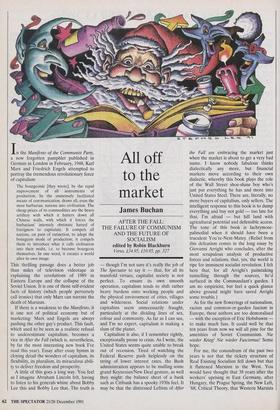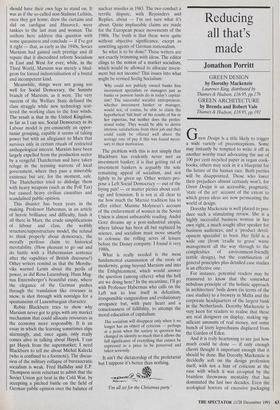I n the Manifesto of the Communist Party, a now forgotten
pamphlet published in German in London in February, 1948, Karl Marx and Friedrich Engels attempted to portray the tremendous revolutionary force of capitalism:
The bourgeoisie [they wrote], by the rapid improvement of all instruments of production, by the immensely facilitated means of communication, draws all, even the most barbarian, nations into civilisation. The cheap prices of its commodities are the heavy artillery with which it batters down all Chinese walls, with which it forces the barbarians' intensely obstinate hatred of foreigners to capitulate. It compels all nations, on pain of extinction, to adopt the bourgeois mode of production; it compels them to introduce what it calls civilisation into their midst, i.e. to become bourgeois themselves. In one word, it creates a world after its own image.
This thrilling passage does a better job than miles of television videotape in explaining the revolutions of 1989 in Eastern Europe and the collapse of the Soviet Union. It is one of those self-evident facts of history (which people perversely call ironies) that only Marx can narrate the death of Marxism.
If there is a weakness to the Manifesto, it is one not of political economy but of. marketing: Marx and Engels are always pushing the other guy's product. This fault, which used to be seen as a realistic refusal to underestimate capitalism, becomes a vice in After the Fall (which is, nevertheless, by far the most interesting new book I've read this year). Essay after essay hymns in cloying detail the wonders of capitalism, its flexibility, its pluralism, its miraculous abili- ty to deliver freedom and prosperity.
A little of this goes a long way. You feel as I imagine Abraham Lincoln felt, having to listen to his generals whine about Bobby Lee this and Bobby Lee that. The truth is
All off to the market
James Buchan
AFTER THE FALL: THE FAILURE OF COMMUNISM AND THE FUTURE OF SOCIALISM edited by Robin Blackburn Verso, £34.95, £10.95, pp. 327 — though I'm not sure it's really the job of The Spectator to say it — that, for all its manifold virtues, capitalist society is not perfect. To ensure its own smooth operation, capitalism tends to shift rather heavy burdens onto working people and the physical environment of cities, villages and wilderness. Social relations under capitalism seem unnecessarily fraught, particularly at the dividing lines of sex, colour and community. As far as I can see, and I'm no expert, capitalism is making a slum of the planet.
Capitalism is also, if I remember rightly, exceptionally prone to crisis. As I write, the United States seems quite unable to break out of recession. Tired of watching the Federal Reserve push helplessly on the string of lower interest rates, the Bush administration appears to be mulling some grand Keynesian/New Deal gesture, as well they might: the balance sheet of a bank such as Citibank has a spooky 1930s feel. It may be that the distressed Leftists of After the Fall are embracing the market just when the market is about to get a very bad name. I know nobody fabulous thinks dialectically any more, but financial markets move according to their own dialectic, whereby this book plays the role of the Wall Street shoe-shine boy who's just put everything he has and more into United States Steel. There are, literally, no more buyers of capitalism, only sellers. The intelligent response to this book is to dump everything and buy not gold — too late for that, I'm afraid — but hill land with agricultural potential and defensible access. The tone of this book is lachrymose- palinodial when it should have been a truculent You're-Next-Matey. (Relief from this defeatism comes in the long essay by Giovanni Arrighi who concludes, after the most scrupulous analysis of productive forces and relations, that, yes, the world is ripe for imminent socialist revolution. I felt here that, for all Arrighi's painstaking tunnelling through the sources, he'd surfaced in the Commandant's garden. I am no empiricist, but feel a quick glance above ground might have saved Arrighi some trouble.) As for the new flowerings of nationalism, racism and common-or-garden fascism in Europe, these authors are too demoralised — with the exception of Eric Hobsbawm to make much fuss. It could well be that ten years from now we will all pine for the amenities of Soviet Communism. Nie wieder Krieg! Nie wieder Fascismus! Some hope.
For me, the conundrum of the past two years is not that the rickety structure of Real Existing Socialism fell down but that it flattened Marxism in the West. You would have thought that 38 years after the workers' uprising in East Germany, after Hungary, the Prague Spring, the New Left, '68; Critical Theory, that Western Marxists
should have their own legs to stand on. It was as if the so-called non-Stalinist Leftists, once they got home, drew the curtains and slid on cardigan and Hausrock, were tankies to the last man and woman. The authors here address this question with some queasiness and conclude — if I've got it right — that, as early as the 1940s, Soviet Marxism had gained such prestige and ill repute that it discredited reform Socialism in East and West for ever; while, in the Third World, Marxism was merely a blud- geon for forced industrialisation of a brutal and incompetent kind.
Meanwhile, things were not going too well for Social Democracy, the Sunnite branch of Marxism, as it were. The very success of the Welfare State defused the class struggle while new technology scat- tered the working class to the four winds. The result is that in the United Kingdom, as far as I can see, Social Democracy in its Labour model is pre-eminently an oppor- tunist grouping, capable it seems of taking power but with an allegiance to Marx that survives only in certain rituals of restricted anthopological interest. Marxists have been largely expelled from the production sector by a vengeful Thatcherism and have taken refuge in the teeming warrens of local government, where they pass a miserable existence but are, for the moment, safe. The Thatcherites tried to dislodge them with heavy weapons (such as the Poll Tax) but caused heavy civilian casualties and scandalised public opinion.
This disaster has been years in the making. Professor Habermas, in an article of heroic brilliance and difficulty, finds it all there in Marx: the crude simplifications of labour and class, the wobbly structure/superstructure model, the refusal to think properly about democracy, the morally perilous claim to historical inevitability. (How pleasant to go out and do battle with a Habermasian sentence after the vapidities of British discourse!) Other writers remind us that the Menshe- viks warned Lenin about the perils of power, as did Rosa Luxemburg. Hans Mag- nus Enzensberger's beautiful essay, where the elegance of the German pushes through the translation like crocuses in snow, is shot through with nostalgia for a spontaneism of Luxemburgian character.
Robin Blackburn tries to show why Marxism never got to grips with any market mechanism that could allocate resources in the economy more responsibly. It is an essay in which the learning sometimes slips alarmingly, and, once again, only really comes alive in talking about Hayek. I can get Hayek from the supermarket; I need Blackburn to tell me about Michal Kalecki (who is confined to a footnote). The discus- sion of the military collapse of bureaucratic socialism is weak. Fred Halliday and E.P. Thompson seem reluctant to admit that the Soviet Union got beat in the Cold War, by accepting a pitched battle on the field of German public opinion over the balance of nuclear missiles in 1983. The two conduct a terrific dispute, with Rejoinders and Replies, about — I'm not sure what it's about. Quite implausible claims are made for the European peace movements of the 1980s. The truth is that these were quite without objective significance, except as unwitting agents of German nationalism.
So what is to be done? These writers are not exactly brimming with ideas. The editor clings to the notion of a market socialism, which would be allowed to allocate invest- ment but not income! This issues into what might be termed Seelig Socialism:
Why could not publicly owned banks hire investment specialists or managers just as banks or pension funds do in today's capital- ism? The successful socialist entrepreneur, whether investment banker or manager, would not, of course, be able to claim the hypothetical 'full fruit' of the results of his or her expertise, but neither does the profes- sional today. They would be able to derive intrinsic satisfactions from their job and they could easily be offered well above the average rate of pay if this was found neces- sary to their motivation.
The problem with this is not simply that Blackburn has evidently never met an investment banker; it is that getting rid of investment bankers is arguably the sole remaining appeal of socialism, and not lightly to be given up. Other writers pro- pose a Left Social Democracy — out of the frying pan! — or mutter pieties about ecol- ogy and feminism. It is not at all clear to me how much the Marxist tradition has to offer either: Maxime Molyneux's account of the enslavement of women in the Soviet Union is almost unbearable reading. Andre Gorz dreams up a post-industrial utopia, where labour has been all but replaced by science, and socialism must move smartly to colonise the rolling acres of leisure before the Disney company. I found it very 1980s.
What is really needed is the most fundamental examination of the roots of modernity, going beyond Marxism and into the Enlightenment, which would answer the question (among others): what the hell are we doing here? In the meantime, I'll go with Professor Habermas who calls on the Left not to lose itself in defeatism, irresponsible vanguardism and evolutionary arrogance but, with pure heart and a consciousness of fallibility, to attempt the moral education of capitalism:
This socialism will disappear only when it no longer has an object of criticism — perhaps at a point when the society in question has changed its identity so much that it allows the full significance of everything that cannot be expressed as a price to be perceived and taken seriously.
It ain't the dictatorship of the proletariat but I suppose it's better than nothing.
`I'm all set for the Christmas party.'











































































































 Previous page
Previous page